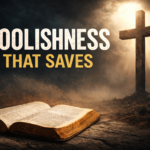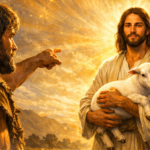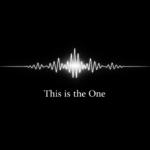“Above All Else : The Last Things” – 1 Thessalonians 4:13-17
introduction: Christian Essentials – Last Things
As we consider a sermon topic – and yes, it’s one of the essentials of our Christian faith – as we consider a sermon topic on the “Last Things” we really need to think about it in answer to two separate but related questions. The first question, the more pertinent and personal question, the one that all of us may be faced with one day is: “What happens when our life on earth is over?” or put another way… “What happens when I die?” The second question, with a broader implication and perhaps a more future impact is: “What will happen at the end of history, when Jesus returns?”
1. “What happens when I die?”
a. Differing views
We’ll start with the more personal question – “What happens when I die?” There are differing views out there in our world. It seems that more and more people these days think that that’s just the end. With that ‘circle of life’ kind of philosophy, they see the body as just becoming compost for a future tree, or maybe ashes to spread in the wind or on the water. There is no sense at all of an existence beyond a person’s last breath. That is the prevalent view of atheists. So, “eat, drink and be merry” is the motto of many people’s lives – all focused on self and pleasures and no concern for others. That’s what we heard about in Jesus’ parable of the rich fool in our Gospel reading. No concern for others, no generosity toward others… just bigger barns for all his grain and stuff. The Ecclesiastes reading had a slightly different perspective – despair that when I die everything that I have worked hard for with wisdom, knowledge and skill will be left for someone else to enjoy. That’s one view of what happens at death. Others with a certain religious world view believe that after death you come back to life as a different being… reincarnation.
The orthodox, historic Biblical view is that there IS life after death, and that resurrection rather than reincarnation is the transition point from one life to another. Now some, within the Christian world view, consider that the soul sleeps until the body is resurrected on the last day. Let’s put that idea to rest. It is true that several times in the New Testament death is spoken of as “sleep.” When Stephen was stoned in Acts 7, it says that he fell asleep, but at the same time he prayed, “Lord Jesus, receive my spirit.” In 1 Thessalonians 4, Paul teaches us about “those who fall asleep.” Even Jesus described a dead 12 year old girl as “not dead, but asleep.” For the Christian, sleep is a particularly apt metaphor for death, since death’s finality and horror are removed by the assurance of resurrection.
b. Body and Soul separated
We do understand that at death, the body and soul (or spirit) of a person are separated. The body decays because, although God did not create people to die, sin brought this fate upon humanity way back in the story of Adam and Eve. It doesn’t take long for that decay to begin. When Lazarus died, and Jesus asked people to take away the stone from the entrance to the tomb, Lazarus’ sister scolded Jesus: “There will be an odor, for he has been dead four days.” So, yes, the body decays, but the soul of the believer goes to God. That is evident from Jesus’ statement to the believing thief beside Him on the cross. Jesus said, “Today you will be with me in paradise.” Obviously the man’s body was not going to be in paradise, but his soul would be… no soul sleep until the final resurrection. Even Paul expressed his desire to “depart and be with Christ which is better by far.” For the apostle, death was the gate that led to full and eternal life with Christ, being in Christ’s very presence at the moment of his death.
Our Old Testament lesson was from Ecclesiastes and it talked about the vanity of life. A few chapters later in the same book, we read about the nature of death: “The dust returns to the ground it came from, and the spirit returns to God who gave it.” What an unlikely source from which to be taught about resurrection.
Another unlikely source is the book of Job. Here’s a guy who endured suffering like no other Bible character. He lost his herds and flocks. His servants were killed. His ten children died in a windstorm. Then he was afflicted with sores from the soles of his feet to the top of his head. Nevertheless, in the middle of the book, we hear Job’s confidence in the resurrection: “I know that my Redeemer lives… and after my skin has been destroyed, yet in my flesh I will see God. I myself will see Him with my own eyes… how my heart yearns within me.” After my skin has been destroyed – after my body dies – I will see God with my own eyes.
Actually, for a time when I was a teenager, I kind of had this sense that, because God was a spirit and because we had a spirit or soul, heaven was just our souls being in the presence of God, Himself. But one day it dawned on me as we were professing the Apostles’ Creed. There is that phrase in the Third Article that made me understand that we believe in the resurrection of THE BODY, not just the spirit. At the moment of death, the soul of a Christian enters the joy of the very presence of God – which is heaven. At some undetermined future last day / Judgment Day, our bodies will be raised to join our spirits and we will be whole and perfect once again, just as God created and intended for us humans to be.
c. Heaven and Hell
You know, somehow from childhood – maybe from TV or cartoons or comic books or now video games – our minds are filled with images of heaven and hell: halos and horns, harps and pitchforks, wings and pointed tails, floating among clouds or sitting in burning flames. It might lead us to ask, “Are heaven and hell real? What does the Bible say about them?”
The Bible doesn’t actually tell us a lot about either heaven or hell. When it does, it uses picture images to describe some truth. So, for instance, we read about hell as being “down there,” in “outer darkness,” with “weeping and gnashing of teeth,” and contrasted with the joy and light of God’s presence “up” in heaven. The Bible does picture heaven as a beautiful city lavished with precious jewels, gates of pearl, and streets of gold. It says there will no pain, no sorrow, no tears. Beyond that, eternal life with God is described as “what no eye has seen, no ear has heard, nor has the heart of man imagined it.” So, at death the spirit of a believer returns to God. At the end of time, our bodies are resurrected.
[Excursus: Cremation?]
Without spending too much time on this, some may be wondering about cremation. Is cremation sinful? Will God resurrect the ashes of a believer that has been cremated? While there are a couple of Old Testament passages about burning a body being looked on negatively, they are mostly in the context of someone having done something detestable. Otherwise, cremation is neither commended nor condemned in the Bible. So, we want to understand that the God we believe in is equally able to raise a person’s remains that have been cremated as He is the remains of a person whose body was buried. After all, a buried body will eventually become ashes anyway. The question of burial or cremation is within the realm of Christian freedom. On the other hand, in life and in death we want to honour and respect the body that God has created. Burial was the standard practice of God’s people in both Old Testament and New Testament times. Burial is also a picture of Baptism in which we are buried with Christ into death and raised with Him to live a new life. But either way – cremation or burial – our God is a God of life and new, resurrected life.
d. Glorious Bodies
One other thing about resurrection comes from Paul’s great Resurrection chapter – 1 Corinthians 15. There Paul says that our bodies will be raised imperishable, immortal, in glory, in power and as spiritual bodies. Perhaps one of the most wonderful images of our future glorified bodies is that of the transformation of a caterpillar, through the cocoon stage, to become a beautiful butterfly. In the same way, our bodies now will be transformed through the cocoon stage of death to become those glorious and heavenly bodies that will be in the presence of God forever.
2. “What will happen at the end of the world?”
It’s time to get to the second question about what will happen at the end of the world, sometimes called the “Day of the Lord” or the “Day of Judgement.” That question is probably answered more directly by the words of Jesus and the writings of Paul and Peter than by the cryptic and mysterious messages found in the book of Revelation. But let’s learn something from all those sources.
a. End-times events
Jesus talked about the things that would happen in the days leading up to the end. He cited wars, rumors of wars, famines and earthquakes, persecution and days of distress. He noted that false prophets and even false Christs would appear, and that there would be a decrease of love and an increase of wickedness. You don’t have to be a genius to conclude that those things are happening and have been happening for centuries already. That is to say that we are living in the last days. Even the writer of the book of Hebrews acknowledged that he was living in the last days, the days when God spoke directly to His people – not through prophets but through His own Son. However, no matter whether we are on the brink of nuclear war, or the disastrous effects of climate change, or the imagined threat of alien invasion, or the dangers of overpopulation and food shortage, Jesus also makes clear that the presence of these signs of the end would never be cause for a prediction. “No one knows about that day or that hour,” He said, with the corresponding encouragement to watch and to always be prepared. Jesus taught His disciples and us to wait for His return in hope and anticipation.
b. Christ’s sudden return
Both Paul and Peter describe the uncertainty and the suddenness of Christ’s return. Paul says “in a flash, in the twinkling of an eye, at the last trumpet.” Peter says “the Day of the Lord will come like a thief.” Jesus used that “thief” analogy, too, saying that just as a homeowner doesn’t know when a thief will break in, so He will return when we do not expect Him. So… be ready!
c. Fire and fears
Peter goes on to describe some details of that “Day of the Lord.” He says “the present heavens and earth are reserved for fire,” and later “the heavens will disappear with a roar; the elements will be destroyed by fire, and the earth and everything in it will be laid bare.” Once more Peter writes, “that day will bring about the destruction of the heavens by fire, and the elements will melt in the heat.” But he adds God’s reassuring promise of a new heaven and a new earth.
The Book of Revelation describes, with its abundance of colours and numbers and animals and symbols and events, the impact of the demonic forces of evil in the world during those last days. Some take the events of the book quite literally, which can raise fears in even the most stout-hearted of people. But the overall message of the Book is that, no matter what threats and temptations Satan throws our way, Jesus has already won the victory over sin, death and the devil for us so that all through life and especially at the end we can sing that “Hallelujah Chorus” – “For the Lord God Omnipotent reigneth… Hallelujah!!”
d. The “dead in Christ” first
Just a couple more pieces to pick up. First, I love the way Paul describes the return of Jesus in 1 Thessalonians 4. He says it so well and succinctly that I’m just going to read it for you:
“Brothers and sisters, we do not want you to be uninformed about those who sleep in death, so that you do not grieve like the rest of mankind, who have no hope. For we believe that Jesus died and rose again, and so we believe that God will bring with Jesus those who have fallen asleep in him. According to the Lord’s word, we tell you that we who are still alive, who are left until the coming of the Lord, will certainly not precede those who have fallen asleep. For the Lord himself will come down from heaven, with a loud command, with the voice of the archangel and with the trumpet call of God, and the dead in Christ will rise first. After that, we who are still alive and are left will be caught up together with them in the clouds to meet the Lord in the air. And so we will be with the Lord forever.”
To summarize, our faith is grounded in the death and resurrection of Jesus. So, what we are going to experience, Jesus has gone through already. He has blazed the trail. When He comes back – at the trumpet call of God – the dead in Christ will rise, then those who are still alive will be gathered up to heaven, and we will be with the Lord forever. That deserves a “Hallelujah!” too. And that’s why Paul could write in our Epistle reading: “seek the things that are above” and “set your minds on things that are above, and not on things that are on earth.”
e. Judgement Day sheep and goats
Finally let’s consider Jesus’ own picture of Judgement Day in Matthew 25. There we hear about Jesus coming in His glory on that last day, and separating the sheep from the goats. The image of sheep was, in both the Old and New Testaments, a picture of God’s faithful people. They are the ones invited to take their eternal and heavenly inheritance in the presence of the Father. As evidence of their faith and faithfulness, Jesus points to the various ways they had helped people in need, thus also caring for Him: feeding, clothing, welcoming, visiting.
In contrast, the goats are sent away to eternal punishment for by their lives they failed to give evidence of their faith in Jesus by helping those in need.
Just as in a human court, there is a declaration of innocence or guilt and then a separate day or statement pronouncing the sentence for the guilty, so Judgement Day is simply a pronouncement of the sentencing based on the evidence of a person’s faith or lack of it.
All in all, the last things are nothing to fear and everything to look forward to. Whether it’s your last day or this world’s last day, Jesus promises to take your soul to His side and to resurrect your body to be the whole and perfect person God intended in the very beginning. Jesus’ own death and resurrection are the model and the guarantee of that. Your faith in Him will one day leave these words of the King ringing joyfully in your ears: “Come, you who are blessed by my Father; take your inheritance, the kingdom prepared for you since the creation of the world.”
Until that day, the ministry of the church goes on. We work faithfully while He is away, and we look forward with joy to the day that He returns. Amen.






